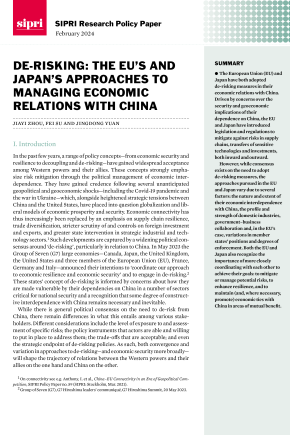De-risking: The EU’s and Japan’s Approaches to Managing Economic Relations with China

The European Union (EU) and Japan have both adopted de-risking measures in their economic relations with China. Driven by concerns over the security and geoeconomic implications of their dependence on China, the EU and Japan have introduced legislation and regulations to mitigate against risks in supply chains and in transfers of sensitive technologies and investments. Measures introduced also aim to boost competitiveness in strategic industries.
However, while consensus exists on the need to adopt de-risking measures, the approaches pursued in the EU and Japan vary due to several factors: the nature and extent of their economic interdependence with China, the profile and strength of domestic industries, government–business collaboration and, in the EU’s case, variations in member states’ positions and degrees of enforcement. Both the EU and Japan also recognize the importance of more closely coordinating with each other to achieve their goals: to mitigate or manage potential risks, to enhance resilience, and to maintain (and, where necessary, promote) economic ties with China in areas of mutual benefit.
I. Introduction
II. The concept of de-risking
III. Policy frameworks of the European Union and Japan
IV. Cooperation between the European Union and Japan
V. Conclusions and recommendations


